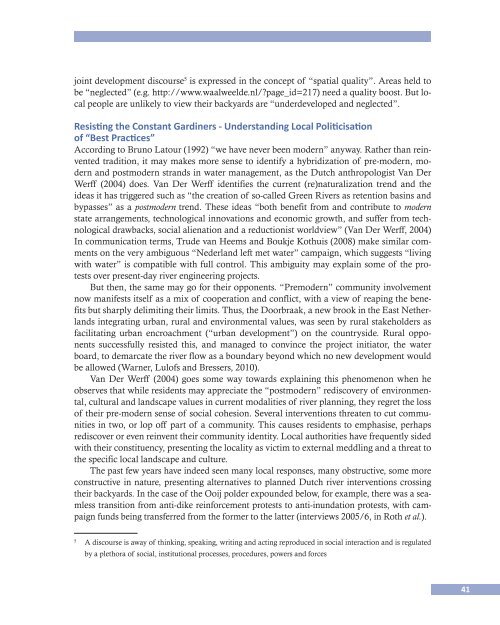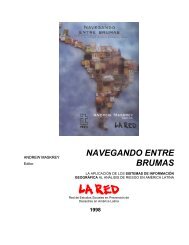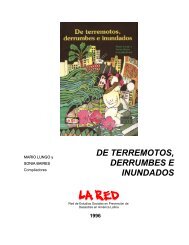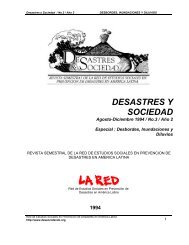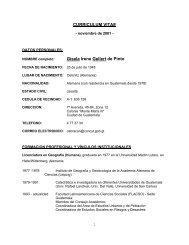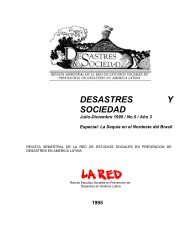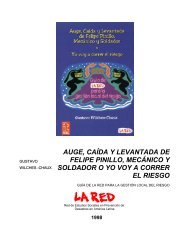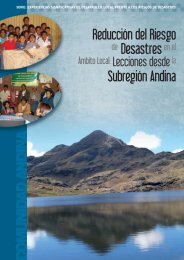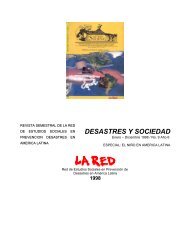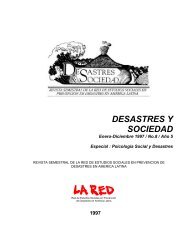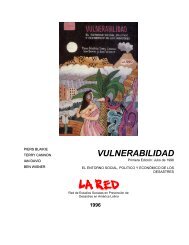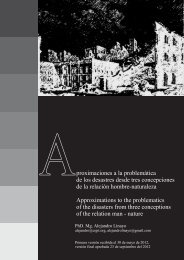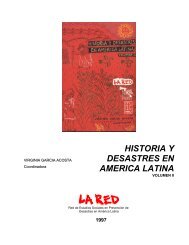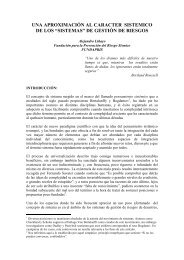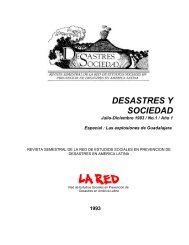Estrategias sociales de prevención y adaptación Social ... - La RED
Estrategias sociales de prevención y adaptación Social ... - La RED
Estrategias sociales de prevención y adaptación Social ... - La RED
Create successful ePaper yourself
Turn your PDF publications into a flip-book with our unique Google optimized e-Paper software.
joint <strong>de</strong>velopment discourse 5 is expressed in the concept of “spatial quality”. Areas held to<br />
be “neglected” (e.g. http://www.waalweel<strong>de</strong>.nl/page_id=217) need a quality boost. But local<br />
people are unlikely to view their backyards are “un<strong>de</strong>r<strong>de</strong>veloped and neglected”.<br />
Resisting the Constant Gardiners - Un<strong>de</strong>rstanding Local Politicisation<br />
of “Best Practices”<br />
According to Bruno <strong>La</strong>tour (1992) “we have never been mo<strong>de</strong>rn” anyway. Rather than reinvented<br />
tradition, it may makes more sense to i<strong>de</strong>ntify a hybridization of pre-mo<strong>de</strong>rn, mo<strong>de</strong>rn<br />
and postmo<strong>de</strong>rn strands in water management, as the Dutch anthropologist Van Der<br />
Werff (2004) does. Van Der Werff i<strong>de</strong>ntifies the current (re)naturalization trend and the<br />
i<strong>de</strong>as it has triggered such as “the creation of so-called Green Rivers as retention basins and<br />
bypasses” as a postmo<strong>de</strong>rn trend. These i<strong>de</strong>as “both benefit from and contribute to mo<strong>de</strong>rn<br />
state arrangements, technological innovations and economic growth, and suffer from technological<br />
drawbacks, social alienation and a reductionist worldview” (Van Der Werff, 2004)<br />
In communication terms, Tru<strong>de</strong> van Heems and Boukje Kothuis (2008) make similar comments<br />
on the very ambiguous “Ne<strong>de</strong>rland left met water” campaign, which suggests “living<br />
with water” is compatible with full control. This ambiguity may explain some of the protests<br />
over present-day river engineering projects.<br />
But then, the same may go for their opponents. “Premo<strong>de</strong>rn” community involvement<br />
now manifests itself as a mix of cooperation and conflict, with a view of reaping the benefits<br />
but sharply <strong>de</strong>limiting their limits. Thus, the Doorbraak, a new brook in the East Netherlands<br />
integrating urban, rural and environmental values, was seen by rural stakehol<strong>de</strong>rs as<br />
facilitating urban encroachment (“urban <strong>de</strong>velopment”) on the countrysi<strong>de</strong>. Rural opponents<br />
successfully resisted this, and managed to convince the project initiator, the water<br />
board, to <strong>de</strong>marcate the river flow as a boundary beyond which no new <strong>de</strong>velopment would<br />
be allowed (Warner, Lulofs and Bressers, 2010).<br />
Van Der Werff (2004) goes some way towards explaining this phenomenon when he<br />
observes that while resi<strong>de</strong>nts may appreciate the “postmo<strong>de</strong>rn” rediscovery of environmental,<br />
cultural and landscape values in current modalities of river planning, they regret the loss<br />
of their pre-mo<strong>de</strong>rn sense of social cohesion. Several interventions threaten to cut communities<br />
in two, or lop off part of a community. This causes resi<strong>de</strong>nts to emphasise, perhaps<br />
rediscover or even reinvent their community i<strong>de</strong>ntity. Local authorities have frequently si<strong>de</strong>d<br />
with their constituency, presenting the locality as victim to external meddling and a threat to<br />
the specific local landscape and culture.<br />
The past few years have in<strong>de</strong>ed seen many local responses, many obstructive, some more<br />
constructive in nature, presenting alternatives to planned Dutch river interventions crossing<br />
their backyards. In the case of the Ooij pol<strong>de</strong>r expoun<strong>de</strong>d below, for example, there was a seamless<br />
transition from anti-dike reinforcement protests to anti-inundation protests, with campaign<br />
funds being transferred from the former to the latter (interviews 2005/6, in Roth et al.).<br />
5<br />
A discourse is away of thinking, speaking, writing and acting reproduced in social interaction and is regulated<br />
by a plethora of social, institutional processes, procedures, powers and forces<br />
41


